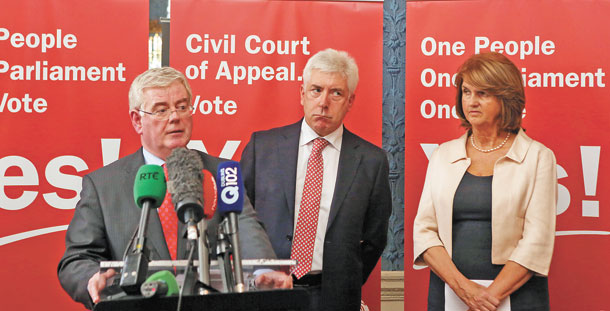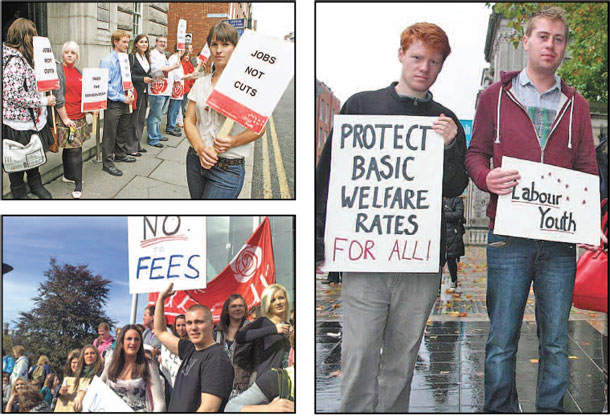1 July 2014 Edition
Does the Labour Paty have a future?

• The leadership contest between Alex White and Joan Burton confirms Labour has no arguments but pure abuse to put up against alternative visions for working-class politics
Every Labour leadership contender has refused to recognise Labour was wrong to reject alternatives to the austerity agenda
DESPITE the massive electoral drubbing experienced by the Labour Party in May’s local and European elections, it would appear from the leadership election contests that no lessons whatsoever have been learned.
Each and every contender has refused to recognise that Labour had been wrong to reject the alternatives to the austerity agenda. And ambiguous suggestions that Labour will be more assertive henceforth are all couched in the policy of Labour remaining an adjunct to right-wing parties and policies.
Given Labour’s seeming inability to change and the electorate’s deep anger at Labour, the question must be put whether Labour has a future at all, and what the implications for Irish politics are of Labour’s potential disappearance.
In last month’s An Phoblacht I argued that it was time for the trade union movement to reconsider fundamentally its relationship with a party that consistently betrays the interests of working people. The leadership campaigns have confirmed that Labour has no arguments but pure abuse to put up against alternative visions for working-class politics.
Thus Labour contenders turned down the opportunity to debate Sinn Féin’s economic alternative, contenting themselves with cries of ‘economic fantasyland’ and so on, forgetting that Labour itself had very similar policies when it was in opposition eight years ago.
It was progressive then, when Labour was trying to win votes, but fantasy now when voters want Labour to live up to their promises.
Equally, Labour is unable to confront the reality of Sinn Féin’s electoral appeal today, going back time and again to tired old arguments about the armed struggle, even though these dishonest arguments manifestly failed to stem Sinn Féin’s electoral rise or justify Labour’s betrayal.
With opinion polls showing that Labour is falling even further behind as it ignores the lessons of the election, it is hard to see how (or for what purpose) Labour can be revived.
Yet labour (with a small ‘l’ in a general rather than a specific sense) is potentially an important part of the Left alliance necessary to defeat the right-wing coalitions that have inflicted such misery upon us.

• Labour had progressive policies when trying to win votes, but they now dismiss similar policies as ‘fantasy’
Genuine social democratic elements and people who currently can only see politics in terms of options within the system can nevertheless play a progressive role if they can break with Labour’s adherence to Eurofanaticism and to the right-wing agenda.
It’s not that I have a high opinion of social democracy. Throughout history and throughout Europe, social democratic parties, believing that the exploitive system can be reformed rather than overthrown, have repeatedly failed the working class.
In Spain today, for example, the Spanish social democrats argue that the people must forget the issues of class and uphold what, in a different context, David Cameron might call “British values”.
But the reality of Irish society is that we are not on the fringe of revolution. And those who set forth an ‘all or nothing’ agenda usually end up with nothing.
The Labour Party is probably too far gone for it to have a future role but the elements that once looked to it can still play a progressive role if they decisively break with looking for coalitions with right-wing parties.
Politicised trade unions – which can only come about when the unions step back from affiliation and create their own political committees to advance their own politics – can be the backbone of a new social democracy, together with community associations and genuine committed individuals.
Sinn Féin will remain the most coherent force on the Left, as it is now, but a broad alliance that combines a clear stance for national sovereignty with a determined championing of the interests of working people, with the active empowerment of communities (as Gerry Adams expressed it) and with a virulent fightback against austerity and the policy of ‘bankers take all’, that is the way that a majority can be created, electorally and politically, for real change, for a real alternative.
It is a sad fact that no elements seem to be coming forward in the Labour Party itself to espouse a united Left politics but the rest of us should move on without them.
Those who left Labour in disgust at its sell-out to austerity should especially look to reorganise and play their part in the fight for freedom.




